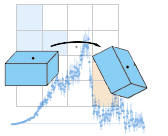
| HOME | PEOPLE | RESEARCH | ACADEMICS | TRAVEL/VISITORS | LINKS | CONTACT |

|
Web Mail
Mailing Lists
Computing Resources
Site Map
CIMMS Lunchtime Series: Cross-scale interactions in dynamical fracture of brittle materials: How atomic interactions govern macroscopic fracture properties
Markus J. Buehler, Division of Chemistry and Chemical Engineering, California Institute of Technology
Thursday, August 18, 200512:00 PM to 1:30 PM
114 Steele (CDS Library)
One of the most fundamental questions in materials science is the behavior, deformation and failure of materials under extreme conditions. In particular, nucleation and motion of cracks plays a critical role in determining the overall mechanical response of materials. Here we focus on systematic studies of how the details of the atomic microstructure and the microscopic interatomic interactions influence the macroscopic response of crack propagation dynamics in brittle materials across different scales. We use massively parallelized atomistic simulations to perform direct numerical simulations of the dynamics of fracture of brittle materials, focusing on the crack limiting speed and the instability dynamics. The results of these calculations are then employed to develop continuum mechanics level theories of crack dynamics within an atomistic-continuum hierarchical multi-scale scheme. We show that under the presence of strongly nonlinear atomic interactions, cracks can move faster than the speed of sound, a phenomenon in clear contradiction to classical theories (Buehler et al., Nature, 2003). This phenomenon of supersonic cracking, first predicted by our modeling, was recently verified by experiment. We explain this finding by our newly discovered characteristic energy length scale χ that describes the region of energy transport near a crack tip. The characteristic energy length scale χ is a new theoretical concept that helps to understand how microscopic details of atomic interaction translate into macroscopic fracture properties of materials. We further demonstrate that the specific nature of the atomic interaction also governs the instability dynamics of cracks. We report a new theory that incorporates the characteristic energy length scale χ in explaining experimental and computational results of the instability dynamics of cracks, referred to as generalized instability model. Our results allow, for the first time, immediate linkage of interatomic potential properties with the instability dynamics of cracks. We have recently extended our models to include the effect of the interplay of complex chemistry and crack extension. Based on hybrid models encompassing regions of reactive potentials (ReaxFF) embedded in non-reactive regions, we model crack propagation in silicon, nickel and aluminum, including oxidative processes due to an environment of O2 molecules close to the crack surfaces. Our models demonstrate the competing mechanisms of formation of oxide layers and crack extension. The calculations are carried out within our Computational Materials Design Facility (CMDF), a new multi-paradigm multi-scale simulation framework enabling seamless integration of quantum mechanical scales with macroscopic theories.
Bio Markus J. Buehler
After his undergraduate education at the University of Stuttgart, Germany in the field of Chemical and Process Engineering, Dr. Buehler received his M.S. degree in Engineering Mechanics from Michigan Technological University, USA, in 2001. From 2001-2004 he worked at the Max Planck Institute for Metals Research in Stuttgart, Germany as a research assistant under Prof. Dr. Huajian Gao, from where he also received his Ph.D. (Dr. rer. nat.) in Chemistry (Materials Science). Since 2004, Dr. Buehler has been working as a Director of Multiscale Modeling at the California Institute of Technology (Caltech), overseeing multiscale method development and applications in modeling of small-scale materials phenomena in the lab of Prof. Dr. William A. Goddard III, with a particular focus on coupling of chemical processes and mechanical properties. Dr. Buehler will join the faculty of the Massachusetts Institute of Technology (MIT) as an Assistant Professor in the Department of Civil and Environmental Engineering (CEE).
|
©2003-2011 California Institute of Technology. All Rights Reserved webmaster |
|